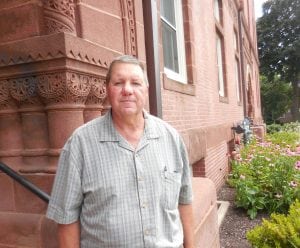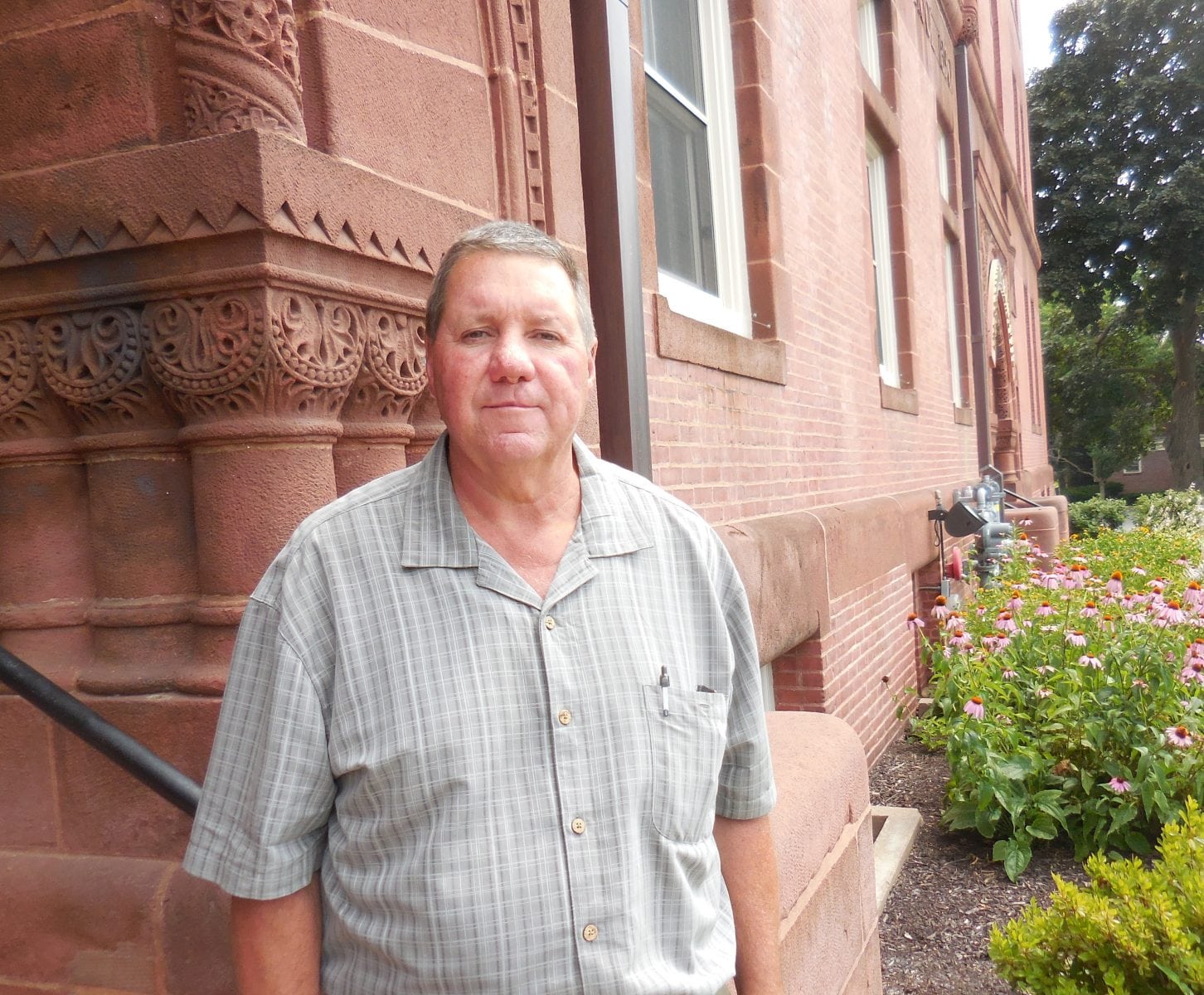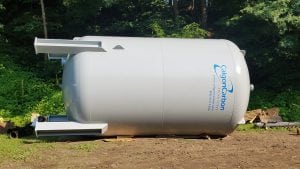
DPW Director David Billips at City Hall on Wednesday. (Photo by Amy Porter)
WESTFIELD – Once the waiting period is up next Wednesday, which is 20 days from the date the $13 million water filtration bond was signed, the Department of Public Works is ready to go forward, according to Director David Billips.
A contractor, R.H. White Construction and Service Solutions out of Auburn has been selected from bids to build the water filtration plant on Wells 7 and 8.
“They have done a lot of work for us. They’re the best firm out there. We were very happy when they won the bid,” Billips said.
After the contract is signed next week, construction on the plant will start. Billips said he is hoping that concrete will be poured before the winter. The four Granular Activated Carbon (GAC) filter vessels for the plant will also be ordered next week. Billips said they expect the plant to be up and running in late spring or early summer of 2019.
Billips said the design on the water filtration plant was done by CDM Smith of Boston. He said the city started working on it in 2016 when the advisory first came out, and Wells 7 and 8 were taken offline. The design has gone through the permit process with the Barnes Aquifer Protection Advisory Committee (BAPAC), the Conservation Commission, Department of Environmental Protection (DEP), plus receiving other permits.
Billips said bench scale testing was done to make sure there was no interference from other constituents in the water, and the system was designed to remove the five perfluorinated (PFAS) compounds of concern. It was also designed for expansion and differing technologies if there are concerns with other compounds.
“All evidence is that the technology works, and it’s being used in other parts of the country successfully,” Billips said, including communities with much higher contamination levels than Westfield.
Billips said DEP also installed GAC filters in four homes, three on Sandy Hill Road and one on Buck Pond Road that have been running for one year, and which moved all of the homes to non-detect levels for the PFAS compounds. “In the middle of the vessels we’ve seen nothing yet; no breakthrough at all,” he said.
Another piece of the bond, the replacement of the East Mountain Water Tank, is also far along in the design process, done by Tata and Howard of Marlborough. “We anticipate that we’ll be going out to bid early next year; with the work to start in the spring,” Billips said. He said there are a lot of issues in designing a water tank, including requiring a permit from the Federal Aviation Administration (FAA) because of its height. Billips said they will be putting a brand new tank next to the old one, which will be demolished. The other three water tanks are also on the bond to be repaired.
Billips said the Springfield interconnection, also a part of the bond, is in its early stages. The department has been meeting with CDM Smith and the Springfield Water and Sewer Commission. He said the city will be tapping into the Springfield line because it’s running through Westfield. They already have two emergency interconnects, he said. The new interconnect will be located in the Honey Pot/Northwest Road area and will replace Wells 5 and 6, which Billips said are shallow, low-yield wells “with a lot of issues.”
The bond also includes the water filtration plant for Wells 1 and 2. Billips said Tighe and Bond will be designing that plant, and have done the preliminary work. He hopes to send that out to bid early next year, and start construction by the time Wells 7 and 8 have come online, although he said they don’t have to wait.
Billips also said that once the DPW has a timeline on all of the projects, they will be posting a project list and timetable, along with regular updates on the progress.
Meanwhile, the temporary GAC filtration vessel for Well 2 arrived two weeks ago. Billips said his department is going to build a structure themselves around the vessel for the winter. He said it’s important to note that the DEP permitted the city for one year for the temporary vessel.
The temporary treatment on Well 2 should be up and running within a month, Billips said. The concrete pad it will sit on has been poured, and is setting.
Once Well 2 is up and running, whether or not Well 1 is taken off line will depend on the demand in the system, according to Systems Engineer Heather Stayton in a recent interview.
To that end, the water commissioners voted to enact an odd-even water restriction in the city beginning July 1, similar to that of the last two years.
The odd-even water restriction states that all non-essential water use is only allowed on Tuesday, Thursday and Saturday before 9 am and after 5 pm at ODD numbered houses; and on Wednesday, Friday and Sunday before 9 am and after 5 pm at EVEN numbered houses.
No non-essential water use is allowed on Mondays. Billips said the system needs one day to recover after high water usage on the weekends.
Examples of “non-essential” water use include: Irrigation of lawns via sprinklers or automatic irrigation systems; washing vehicles, except in a commercial car wash or as necessary for operator safety; and washing of exterior building surfaces, parking lots, driveways or sidewalks, except as necessary to apply surface treatments such as paint, preservatives, stucco, pavement or cement.
Examples of water use that may be allowed: Irrigation to establish a new lawn and new plantings during the months of May and September; Irrigation of lawns, gardens, flowers and ornamental plants by means of a hand-held hose, soaker hose or drip irrigation system.
Examples of water uses NOT subject to restrictions: For health and safety reasons; by regulation; for the production of food and fiber; for the maintenance of livestock; or to meet the core functions of a business (for example, irrigation by golf courses as necessary to maintain tees, greens, and limited fairway watering, or irrigation by plant nurseries as necessary to maintain stock).
Billips said since it was enacted, daily usage is down, so the majority of the people are following the water restriction.
“It is time for this city to come together; elected officials, city employees and the community as a whole to come together, move forward and fix this problem, which we’re confident that we’ll do,” Billips said.







